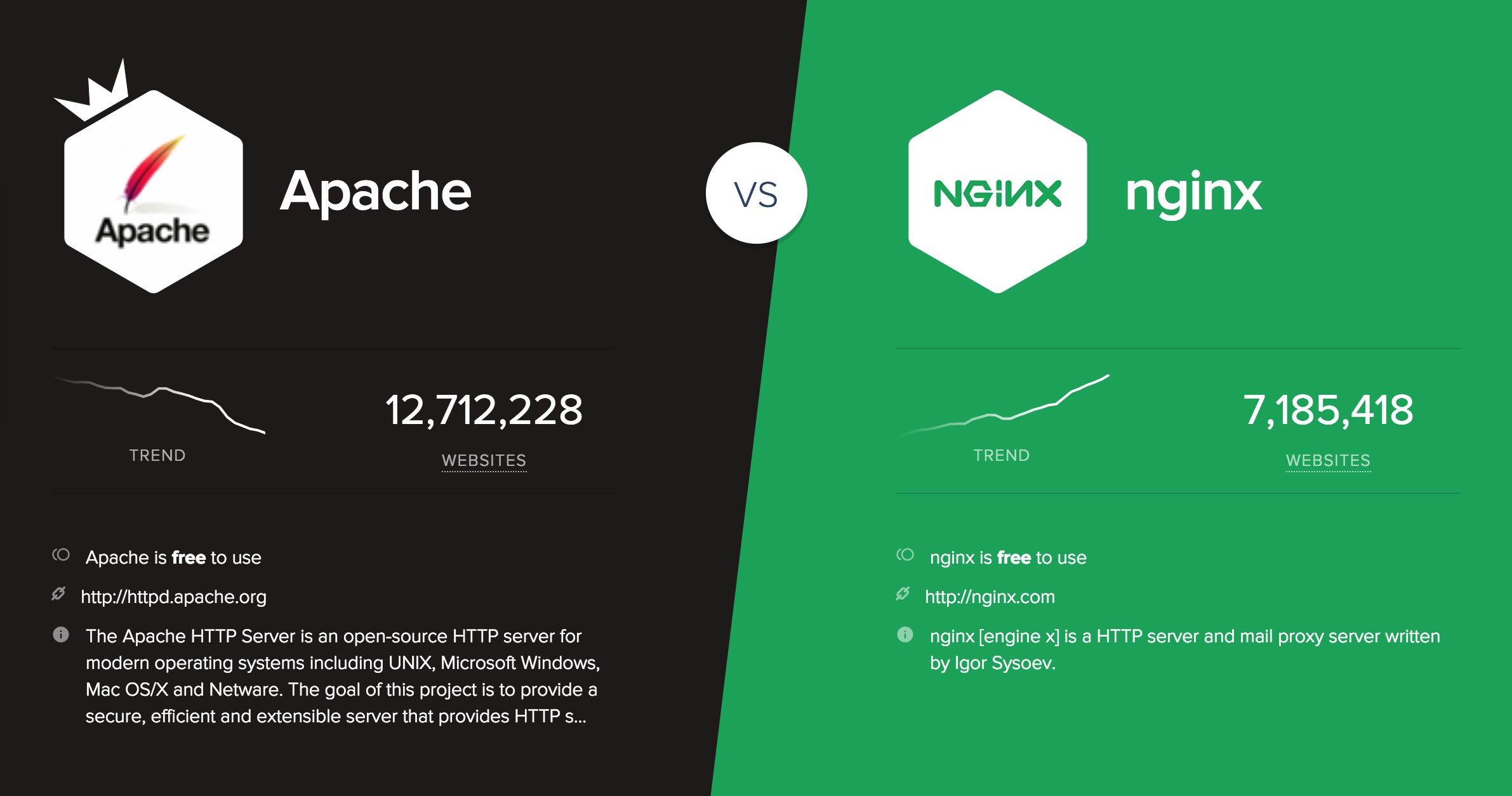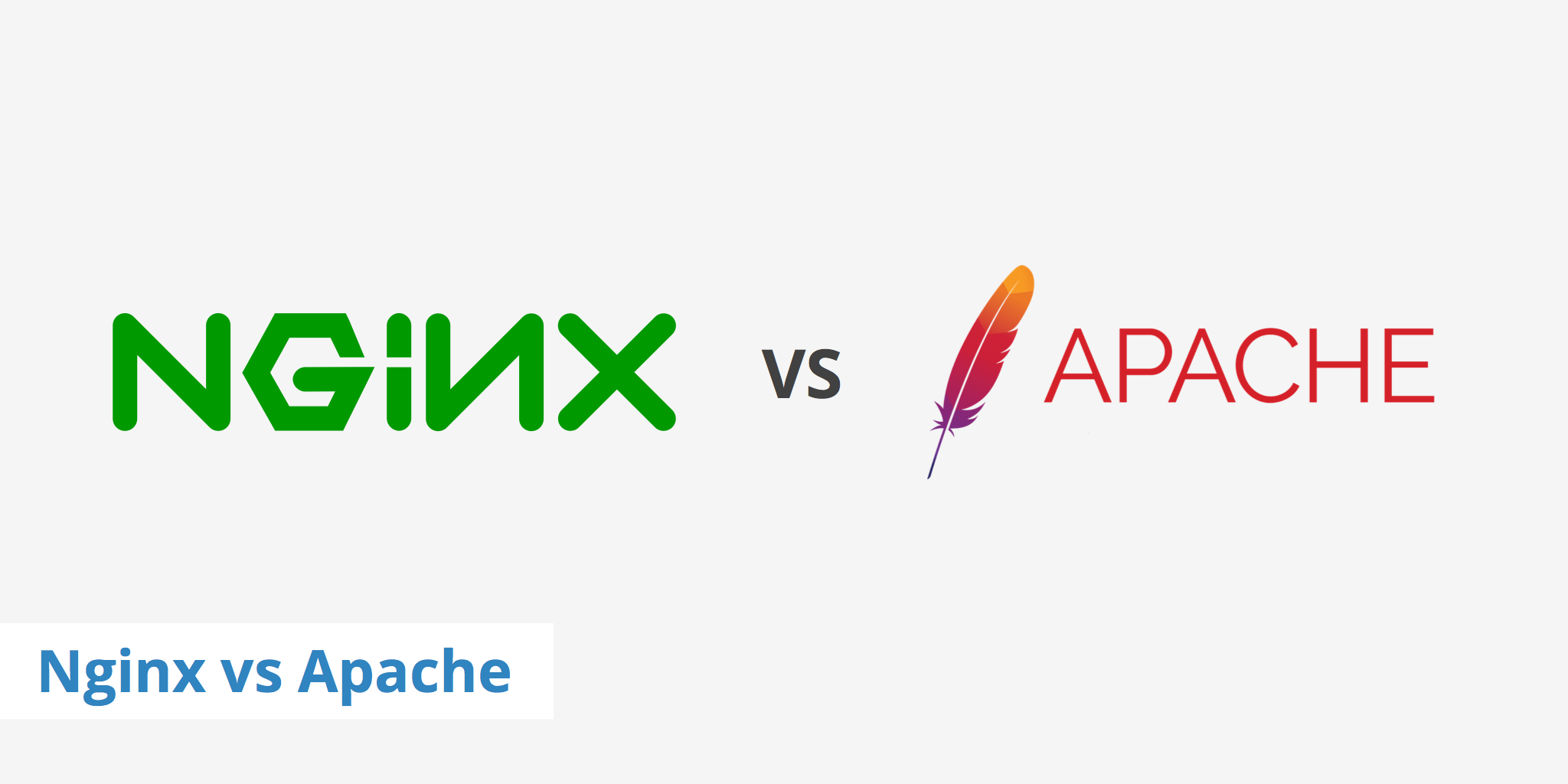Apache vs Nginx
26 November, 2020Apache and NGINX are the two most widely used web servers in the world, and they are responsible for serving over 50% of traffic on the internet. Both of these solutions are largely capable of handling diverse work loads.The main difference between Apache and NGINX lies in their design architecture. Apache uses a process-driven architecture to create a new thread for each request while NGINX uses an event-driven approach to handle multiple requests within one thread.
What is Apache HTTP Server?
Apache HTTP Server was created by Robert McCool in 1995 and it has been the most popular web server in the internet ever since its inception. Apache server is developed and maintained by an open community of developers under ASF. It mostly runs on Linux, and powers around 46% of the websites around the world.
Apache is usually chosen by people around the world for its flexibility, power, and widespread support. It can process a large number of interpreted languages and is a core part of the LAMP (Linux, Apache, MySQL, PHP) stack.
What is NGINX Web Server?
NGINX web server was released in 2004 by Igor Sysoev as an answer to the C10K problem, which was a challenge for web servers to begin handling ten thousand concurrent connections as a requirement for the modern web.
At first, it was mostly used as a supplement to Apache but today it does much more than just that. Nowadays, Nginx is often used as a reverse proxy, load balancer, mail proxy and for HTTP caching. It also has gained quite some popularity ever since its inception due to its light-weight resource utilization and its ability to scale easily on minimal hardware. Nginx is often used by people around the world for its resource efficiency and responsiveness under load.

Which works best?
While Apache and Nginx share many qualities, they are different and perform differently in many areas. Each excels in its own way and, depending on your need, one may do a better job than the other. To know the differences and reach out to a conclusion, let’s go through the detailed, end-to-end comparison below:
Static Content
NGINX performs 2.5 times faster than Apache on a benchmark test for running upto1000 connections simultaneously. NGINX also consumes slightly less memory. So, without a doubt, NGINX wins this contest for serving static content.
Dynamic Content
A benchmark which compares dynamic content serving by Apache and NGINX revealed that when Apache linked with PHP-FPM module yields the same results as can NGINX with PHP. They can both manage almost the same concurrency. The result is down to the request processing time being spent in the PHP runtime environment instead of the core part of the web server.
The PHP runtime environment is fairly similar between the two web servers. However, if you need to get more speed from dynamic pages, you have a few options: add a Varnish or Memcached caching layer, do load balancing, switch to a faster PHP runtime (e.g., HHVM ) or invest in extra hardware
OS Support
Apache works with all Unix-like systems (such as Linux or BSD) and fully supports Microsoft Windows. NGINX only runs on few of them, and has some support for Windows, although performance is not as strong in NGINX. Apache has the edge with this one.
Security
Both Apache and Nginx have an excellent record of security for their C-based code base, but the NGINX code base is admittedly not as big. Also, vulnerability reporting is available for Apache 2.2 and 2.4. Apache also offers configuration tips for handling DDoS attacks.
Flexibility
You can customize the web server by writing web modules. Apache offers dynamic module loading, however NGINX is a different story. NGINX only got support for dynamic module loading at the start of 2016. Before that, the you had to compile the modules into the NGINX binary. Most modules don’t support dynamic loading yet, but this will properly change in time. Apache is obviously ahead here.
Community Support
Apache offers user support via mailing lists, Stack Overflow and IRC. NGINX community support mirrors Apache’s, and there is also a forum. The company behind NGINX sells a commercial product called NGINX Plus, which supports a set of additional features that cover load-balancing, media streaming, and monitoring.

Conclusion
Apache and NGINX compete well with each other in most scenarios. It is well obvious that both are quite powerful, flexible, and capable. Deciding which server works best for you is largely a function of evaluating your specific requirements. There are differences between projects that have an impact on the raw performance. However, this is usually the result of a series of trade-offs that should not be casually dismissed. In the end, there is no one-size-fits-all web server, so use the solution that best aligns with your objectives.
If you have any query related to technology consulting services, feel free to contact Aiksol




